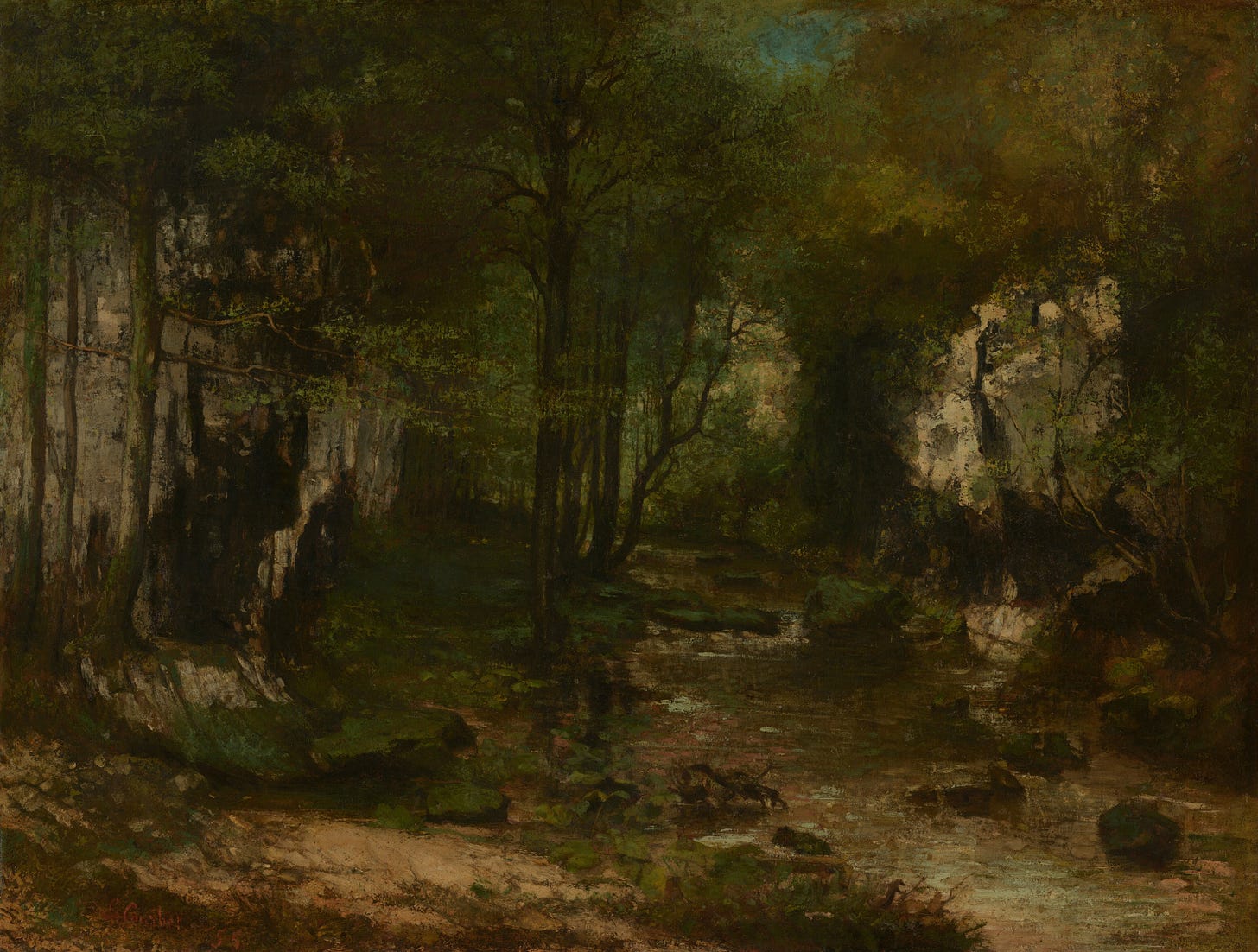
An excerpt from Fahrenheit 451, an American dystopian novel. But before that, some context for the uninitiated who have yet to read the healthful book. A man-hunt has been underway — a hunt for our protagonist, the book-burning-firefighter-turned-book-reader, Guy Montag. The firefighter has outrun and escaped the vain, noisome city he once served by running out past the borders of the metropolis to the river which floated him far out into the oddly dark, quiet, very real country. It is out here that the remaining stains of an old way are washed away, and the struggling Montag emerges at last from his inner struggle triumphant and reborn into a society of lowly literary-servants. Let’s take a look:
Half an hour later…he saw the fire ahead.
The fire was gone, then back again, like a winking eye. He stopped, afraid he might blow the fire out with a single breath. But the fire was there and he approached it warily, from a long way off. It took the better part of fifteen minutes before he drew very close indeed to it, and then he stood looking at it from the cover. That small motion, the white and red color, a strange fire because it meant a different thing to him.
It was not burning, it was warming.
He saw hands held to its warmth, hands without arms, hidden in darkness. Above the hands, motionless faces that were only moved and tossed and flickered with firelight. He hadn’t known fire could look this way. He had never thought in his life that it could give as well as take. Even its smell was different.
…He stood a long long time, listening to the warm crackle of the flames.
There was a silence gathered all about that fire and the silence was in the men’s faces, and time was there, time enough to sit by this rusting track under the trees, and look at the world and turn it over with the eyes, as if it were held to the center of the bonfire, a piece of steel these men were all shaping. It was not only the fire that was different. It was the silence. Montag moved toward this special silence that was concerned with all of the world.
And then the voices began and they were talking, and he could hear nothing of what the voices said, but the sound rose and fell quietly and the voices were turning the world over and looking at it; the voices knew the land and the trees and the city which lay down the track by the river. The voices talked of everything, there was nothing they could not talk about, he knew, from the very cadence and motion and continual stir of curiosity and wonder in them.
And then one of the men looked up and saw him, for the first or perhaps the seventh time, and a voice called to Montag:
“All right, you can come out now!”
Montag stepped back in the shadows.
“It’s all right,” the voice said. “You’re welcome here.”1
I was not born a bookworm. I did not spend my childhood reading. I was never enamored by words printed on a page or enchanted by fairy tales. I definitely did not grow up with the desire to open up and read anything. The only time you would’ve found my face in a book is when I’d fallen asleep reading for school.
However, now in my mid-twenties you’ll hardly catch me without a book. If it’s not in my hand it’s within arm’s reach or at the very least quickly accessible in my wife’s purse, my backpack, or the next room over. I have fallen in love — crazy, mad love — with books, and reading has become a core part of who I am. A burning passion for literature keeps my soul alive and burning.
This dichotomy — a nonliterary youth and ferociously literary adult — makes for an interesting dynamic when interacting with other literary minds. I sound like a natural bookworm; I give the impression that I’ve spent a lot of time reading since early childhood; others assume I’ve read a number of classics and other monumental works; they assume I’m familiar with countless famed authors — old and new. But none of it’s true (usually).
The experience is kind of like being asked about classic American films or oldies music. Yes, I’m American, but I have little (if any) knowledge of these things. Most people, completely perplexed by this, look at me incredulously as though I’ve been living under a rock my whole life. But no rock. Just two immigrant parents. The U.S. may very well be my homeland, but my roots are in Colombia, my motherland. I have acquired the ways of this country and knowledge of it, but it was learned over time.
Similarly, books are my “home” now, but my roots do not lie there. I am an initiate into the community of serious readers — like a naturalized citizen. I have acquired the literary mind and learned the ways of serious readers, but I’m of a different breed than the cradle bookworms. I see the world differently.
I have commonly felt like this makes me less of a literary mind. Or at least a literary mind of less significance. But it doesn’t. For one, the measure of a literary mind is not so much in quantity as it is in disposition: That is because the literary mind is not some status earned by completing daunting reading lists or earning fancy degrees. The literary mind is a way of living — a manner of life marked by both a passion for and a reverent fear of great books. The question, then, that separates the sheep and goats, the chaff and wheat, the literary and non-literary minds, the questions is not how much a man reads but whether a man reads well, reads meaningfully and actively with serious attention, intention, and personal internalization.
I may not have hundreds or thousands of books under my belt, but you better believe that the books I have read (and continue to read at a snail’s pace) were searched out with an utmost solemness and with an equally enchanted, childlike abandon.
I am of a literary mind.
That I had my misconceptions about literature; that I made judgments hastily and spoke haughtily in my (earlier) youth; that I have wasted a great many years in animosity toward books; that I have been an idiot and made mistakes, all of it is true. But, it seems that I “made the right kind of mistakes, or else [I] wouldn’t be here.”2 And that I’m here is what matters most.
My late initiation does nothing to negate my status as a literary mind. But it does qualify the kind of literary mind that I am. I know what it’s like to hate reading. I remember it vividly, viscerally. I know — and understand — why others don’t care to read. And I happen, also, to know what it takes for the non-literary mind to become one. Because such is my story.
So, I do not judge or gibe those who remain blind to the joys or benefits of reading. I empathize. I do not act as though I am loftier than my fellow non-readers, for I have learned along the way that I am truly “nothing more than [a] dust jacket for books…[I am] not important.”3 Condescension never won over the book-hater, anyway. No. I do not ridicule or shame; I simply…read to them. With love, passion, emotion, vivacity, with wonder — the same things that awakened my sluggish mind, warmed my cold book-less soul, and helped me realize and remember the rich things of this life.
I am the Montag among literary minds. I was long delayed, lamentably, and irreversibly; but I have arrived. Following in the steps of dear Clarisse I escaped the lies, the noise, the prison-house of the solitary mind,4 and I have been reborn out in the dark country by the firelight and smoke. And now I turn. It’s my turn to help others escape the metropolis, to loose dulled souls from the numbing grasp of passive pleasures and set them ablaze with wonder and insatiable desire.
Not many, I’m sure, will see the way immediately. Not many will care to trek that lonesome trail out in the dark, quiet country. But one day some will. They will remember; they will escape, even if it’s long after I’m gone. And on that day, they’ll wander out and about in the country, following those tracks laid down by generations before us, and they will suddenly think with an un-provable certainty: I know — though I cannot prove it — I know that “once, long ago [Augy] walked here where [I am] walking now.”5 And they will be right.
Then after walking from a long, long way off, they will stumble upon us out there in the silence, a silence that speaks. They will find me turning over the world with other kindred spirits by the warmth of an open flame, and I’ll call out to them.
You can come out now. You’re welcome here. Sit…Have some coffee?6
An excerpt from Ray Bradbury’s American dystopian novel, Fahrenheit 451 (New York: Simon & Schuster Paperbacks, 2018). 138-140.
Ibid, 143.
Ibid, 146.
I am alluding to a quote from C.S. Lewis: “Those of us who have been true readers all our life seldom fully realize the enormous extension of our being which we owe to authors...We realize it best when we talk with an unliterary friend. He may be full of goodness and good sense but he inhabits a tiny world. In it, we should be suffocated. The man who is contented to be only himself, and therefore less a self, is in prison. My own eyes are not enough for me, I will see through those of others.” Though I have not read it myself, the quote can be found in his book, An Experiment in Criticism.
Ibid, 138.
Ibid, 140.





